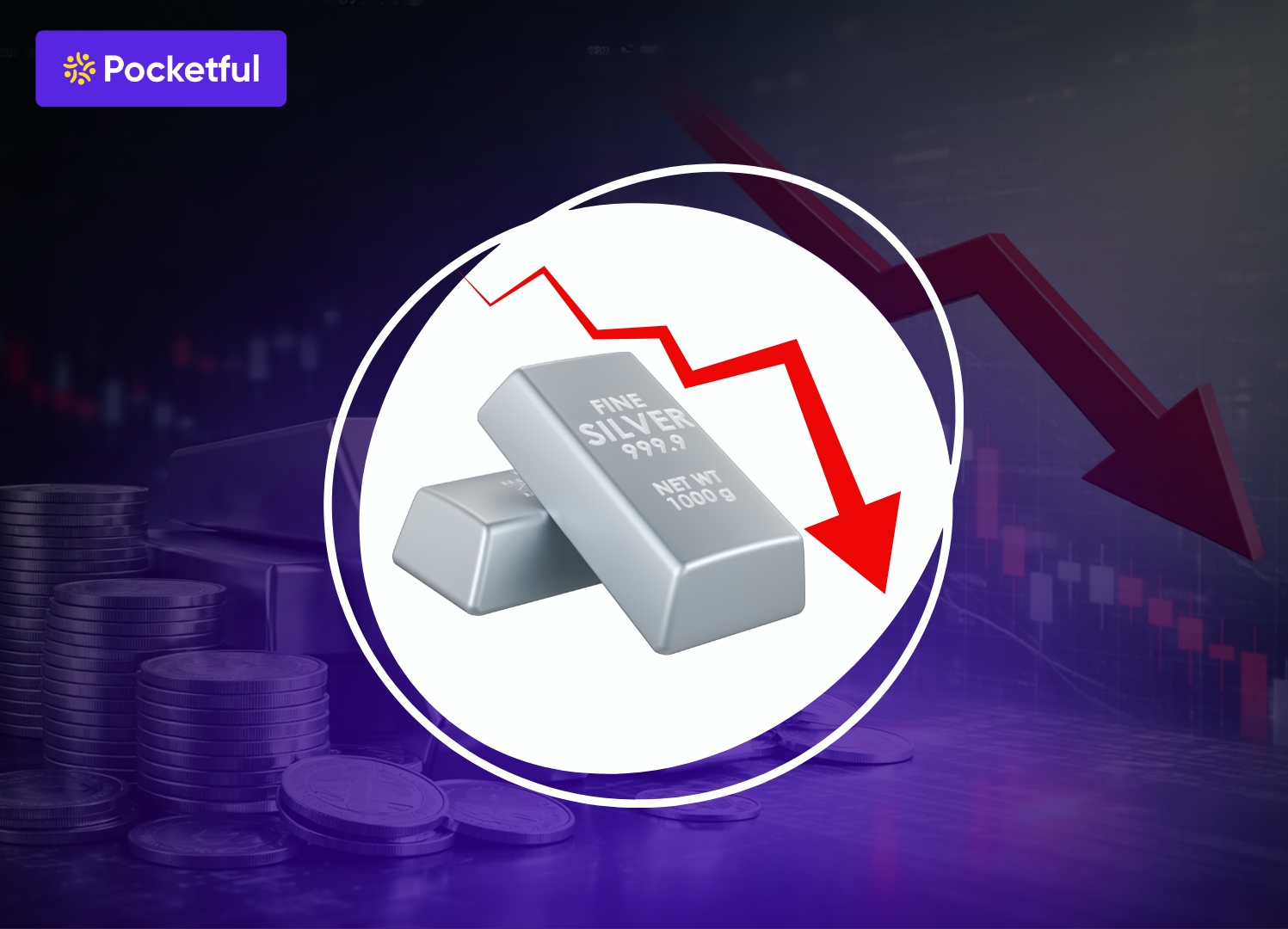If you have also been tracking silver prices lately and felt annoyed, confused, or slightly worried, you are definitely not alone. Almost every correction triggers the same questions in an investor’s mind
- Why is silver down today?
- Why is silver dropping so suddenly?
- Why is silver going down when inflation has not disappeared?
Silver can rally sharply, then fall just as fast, often without warning. Price drops in silver are rarely random. Once you understand the reasons, you will easily comprehend the metals. Let us break this down for you in simple language. In this blog, we will clearly explain why silver prices fall, what really drives these sudden corrections, and how investors should understand silver’s volatility with clarity and confidence.
Current Silver Scenario in the Markets
Silver often wears two hats. On one side, it is a precious metal, a hedge, a store of value, an alternative to currency and on the other hand, it is an industrial metal, used in solar panels, electronics, EVs, and medical equipments.
So when prices fall, it is not about just one thing. Silver reacts to both economic fear and economic growth. That dual nature is the key to understanding why silver is down today.
On 29 January, silver on the MCX was trading at ₹420,048. What followed was a sharp and rapid correction. Prices slid to ₹291,925, wiping out ₹128,123 in value, a decline of roughly 31%.
To put this in perspective, nearly a third of the price was erased in a short span, the kind of move that forces traders to reassess positions rather than simply “wait it out.”
Key Reasons of the Fall
1. New Chairman of Federal Reserve
The immediate trigger was the nomination of Kevin Warsh as the next Chair of the Federal Reserve by President Donald Trump. For markets, this mattered more than it may sound at first.
Warsh is widely seen as hawkish on inflation, i.e., he controls rising prices over promotion of short-term economic growth.
In simple terms, markets interpreted his nomination as a signal that easy money is unlikely to return anytime soon. That expectation alone was enough to reset prices.
2. A Strong US Dollar Is Often the Immediate Trigger
If you are looking for the most common and most boring (but powerful) reason, this is it.
Silver is priced globally in US dollars. When the dollar strengthens, silver automatically becomes more expensive for buyers in other currencies. Demand softens, and prices slip.
3. Sometimes the Fall Is Just Profit Booking
This happens even when nothing has changed about silver itself. Not every fall needs a scary explanation. Silver is volatile which is part of its personality.
After a sharp rally, traders do what traders always do: they book profits. Funds rebalance. Algorithms trigger sell orders. Momentum fades, and a quick drop can be seen which is nothing but just regular profit booking.
4. Increase Copper Margin Requirements
A SEBI Registered commodity expert stated that the selling pressure did not come out of nowhere. It built up quietly, and then hit all at once.
It started when the Chicago Mercantile Exchange raised margin requirements on copper contracts to 20%. That move immediately set off alarm bells across the commodities market. Traders began worrying: If copper margins can be raised overnight, could gold and silver be next? Those fears spread fast.
At the same time, gold and silver prices were already stretched to their limits. They had rallied hard and were sitting in overbought territory, the zone where even a small trigger can cause a sharp pullback.
Traders rushed to cut positions before margins could rise, triggering panic selling.
5. Reduction in Import Duty of Gold & Silver in Budget 2026
The Government of India may consider cutting import duties on gold and silver to revive demand in the jewellery sector. That sector has been under visible strain after a sharp rise in precious metal prices, which has made jewellery increasingly unaffordable for everyday buyers.
Several delegations from the gems and jewellery sector have reportedly urged the government to reduce import duties on gold and silver. Lower duties could bring prices down slightly, improve affordability, and help revive volumes. Now here’s where markets start reacting before anything is officially announced.
If the government signals or confirms a duty cut in the Union Budget 2026, domestic gold and silver prices could face further pressure.
6. Unchanged Fed Rates
When the Federal Reserve chose to keep interest rates unchanged, the US dollar got a fresh boost. That strength made gold and silver costlier for overseas buyers, which quickly cooled buying interest. At the same time, higher yields in the system made assets like bonds more attractive, pulling money away from non-yielding metals such as gold and silver.
What to Expect Ahead?
After a sharp correction like this, the most important thing to remember is simple: markets rarely bounce back immediately.
Instead of a rebound, silver is more likely to enter a phase of consolidation. Prices may move up and down within a range as the market digests what just happened. Momentum does not return instantly.
In simple terms, buyers turn cautious, sellers hesitate, and volumes dry up until a clearer signal emerges.
For prices to move meaningfully higher from here, silver will need fresh support on technical charts.
On the downside, the risk is not completely off the table either. If concerns around margins, policy uncertainty, or global growth resurface, silver could still test lower support levels. After a big fall, markets often retest investor confidence before stabilising.
Conclusion
The recent decline in gold and silver was caused by a combination of pressure points happening simultaneously, including hawkish signals by the Federal Reserve, concerns about tightening margin and speculation on domestic policy regarding import duties.
Above all, this action is more of a post-overheated rally erase than a beginning of a down cycle. Once the prices ascend too rapidly, markets are likely to come down in a big way. It is painful, yet it is natural, particularly in commodities.
It is not about panicking and rather about discipline. Those who remain patient and clear about their time horizon usually come out stronger on the other side.
For more market news and insights, download Pocketful – offering zero brokerage on delivery trades and an easy-to-use platform designed for both new and experienced investors.
Frequently Asked Questions (FAQs)
Why is silver down today?
Silver is under pressure due to a stronger US dollar, elevated interest rates, and profit booking after a sharp rally.
Why did silver fall so sharply in a short time?
Overbought conditions, margin-related fears, and Fed interest rate fears caused rapid selling.
Does this fall mean silver has entered a bear market?
No. Current price action looks like a correction rather than a long-term trend reversal.
Why does a stronger US dollar hurt silver prices?
Since silver is priced in dollars, a stronger dollar makes it more expensive for overseas buyers.
Is a 30% fall in silver a buying opportunity?
It depends on your risk tolerance and investment horizon. Long-term investors and short-term traders view such falls very differently.










